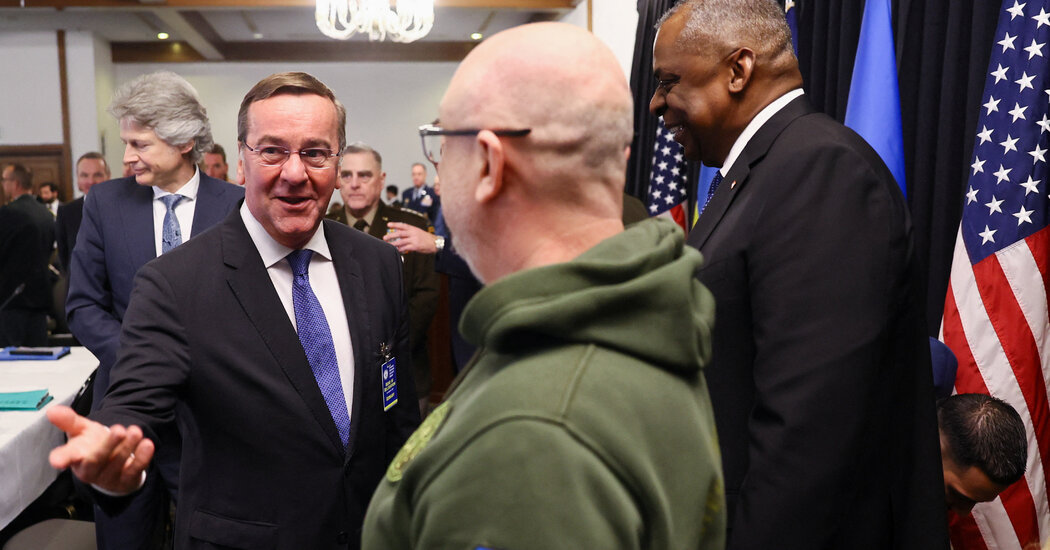
Western defense officials are still working to reach an agreement on providing Leopard 2 tanks to Ukraine.
BERLIN — With the clock ticking on an expected announcement of whether more Western tanks would be sent to Ukraine, negotiators from Kyiv’s allies were still trying to reach a consensus.
Despite mounting pressure from many European allies, it was unclear whether Berlin would send some of its Leopard 2 tanks to Ukraine or allow other European nations to send their own supplies of the German-made vehicle to the fight.
Boris Pistorius, Germany’s new defense minister, said during a break in negotiations at Ramstein Air Base in the afternoon that there was still no agreement on sending the Leopard 2 main battle tank. He did say that he had ordered an audit of all available Leopard battle tanks in Germany to be ready if a decision were made to send the country’s own tanks to Ukraine.
He said that such a decision could potentially take between a day and weeks to reach, but that Germany wanted to be ready. “Then, we would be able to act immediately and deliver the support within a very short period of time,” he said.
“None of us can say today when a decision will be made and what the decision will be,” Mr. Pistorius said. He also said that “the impression that has occasionally been created that there is a united coalition and that Germany is standing in the way is wrong.”
There have been suggestions that Berlin does not want to send any of its own Leopards unless the United States agrees to also send its M1 Abrams tanks, which the Biden administration has been reluctant to do. But Mr. Pistorius said in an interview on Thursday night that he was “not aware of any such linkage.”
Even if Germany does not send its own Leopards, there is another path: As the tank’s maker, Germany could authorize the other 12 European nations that use them to donate some to Kyiv. They could then be sent quickly, though Ukrainian crews would have to be trained in using them. Security analysts have argued for the transfer of Leopards to Ukraine to be shared across Europe, easing the burden on individual countries.

Mr. Pistorius told reporters in Ramstein on Friday that Germany was not “standing in the way” on the talks.Credit…Ronald Wittek/EPA, via Shutterstock
In the lead-up to the meeting, a gathering of the Ukraine Defense Contact Group, Kyiv’s allies promised significant supplies of weapons to the front line. Flanked by Ukraine’s defense minister, Oleksii Reznikov, and Mark A. Milley, the chairman of the Joint Chiefs of Staff, the U.S. defense secretary, Lloyd J. Austin III, reiterated on Friday that the United States would support Ukraine for “as long as it takes.”
“Russia is regrouping, recruiting and trying to re-equip. This is not a moment to slow down — it’s a time to dig deeper,” Mr. Austin said. “The Ukrainian people are watching us, the Kremlin is watching us, and history is watching us,” he added.
The meeting, which includes officials from as many as 50 countries, is focused on how to provide weapons to Ukraine to try to push back Russian troops from occupied territory in eastern Ukraine.
Ukraine has asked for both the U.S.-made Abrams and Germany’s Leopard 2 tank, of which 2,000 are available across Europe. The Leopard is widely seen as the best option, given that it is already on the continent and many European allies have spare parts and the ability to train Ukrainian fighters on the tank.
Speaking via livestream at the opening of the Ramstein event, Ukraine’s president, Volodymyr Zelensky, addressed the tensions in the room by reiterating his plea for tanks. He said his gratitude for previous weapons supplies could not change the pace at which the war was moving, requiring new equipment.
Mr. Zelensky also made it clear that the call for tanks was the beginning of a push for more advanced weapons — a position that means such difficult debate among Kyiv’s NATO allies will most likely continue.
The Kremlin on Friday played down the potential impact of Western battle tanks in Ukraine. In his daily conference call with reporters, Dmitri S. Peskov, the Kremlin’s spokesman, reiterated what has been Russia’s line since the beginning of its invasion: Western arms supplies will only deepen the suffering of Ukrainians before Russia’s inevitable victory.
“We’ve said repeatedly that such deliveries will not be able to principally change anything,” Mr. Peskov said, according to the Interfax news agency.
Anton Troianovski contributed reporting.
